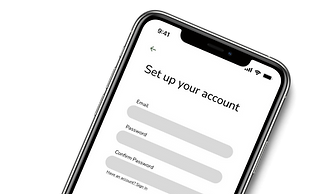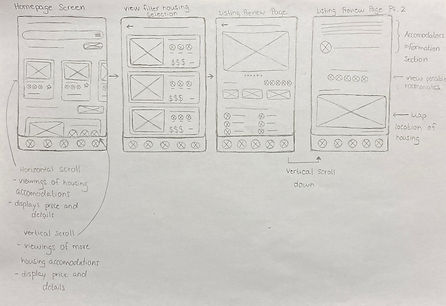top of page





How can we help post-secondary students look for housing accommodations and compatible roommates?
Project Type
Personal Case Study
Duration
4 months
Role
Design Lead
Team
4 Business and Design Students
Project Overview
As the Lead Designer for Hello Dorm, I worked alongside a team of four talented business and design students to tackle the challenge of helping post-secondary students in the Waterloo region find housing that truly fits their needs. We wanted to create a platform that made the housing search easier by offering personalized filters and options, while also helping students connect with potential roommates based on shared preferences. By collaborating closely with each other and with local housing providers, we aimed to build a solution that not only simplified the process but also made students feel more at home in their new community.
Living comfortably <3
🔍 The Problem Space
Many students pursuing post-secondary education face difficulty finding suitable, affordable, and trustworthy housing accommodations during their studies. This issue arises from a combination of factors, including the limited availability of off-campus housing options and the accessible accommodation information. Hence, hello dorm was created.
Hello Dorm was a personal case study project that I had come up with during my semester break. As the Product Design lead, I was able to facilitate co-creation sessions with the design team, carry out user interviews, design the brand identity for the hello dorm application, create prototypes, and refine the designs based on usability test results.
Goal
The primary goal of this project was to develop a mobile application that provides a comprehensive solution to address the housing and accommodation challenges faced by post-secondary students. This application aims to help students easily find trustworthy housing accommodations and potential roommates.
💡 Ideation Process
To get the most out of my ideas, during the brainstorming sessions, I generated and explored ideas, solutions, and insights that could be resourceful during the development process of hello dorm. In the teams' discussion, we shared and assessed the priorities of the mobile application based on relevance, feasibility, and potential impacts. By doing this, we were able to experiment with each of our ideas and determine which approaches would be the most fitting for the project.

As a team, we brainstormed potential ideas that could be included in the mobile application. I categorized these ideas into four distinct groups, each distinguished by colour coordination.
Research Process
User Interviews
Even though I was familiar with my own challenges, my goal was to understand the difficulties faced by other post-secondary students by conducting user interviews. This user-centered approach allowed me to create a platform that addresses everyone's concerns and serves as a valuable resource for students seeking housing accommodations and compatible roommates. Using these observations, I was able to narrow down three key pain points to consider throughout the design process, ensuring that I fulfilled all those requirements.
1. Time Consuming
"I found the efficiency of finding a place was not the greatest. It seems to be a hassle trying to look for available rooms and the pricing for them."
2. Lack of efficieny and effectivness
"I found it difficult to look for housing within my budget and that follows my preferences. I found it troubling that many of the accommodations had a blend of things I wanted and did not want."
3. Untrustworthy platform
"When posting a sublet, I’m concerned about finding someone who will pay rent on time, if at all, and who will pay the total cost of rent. When finding a room, I’m concerned about the landlord since scams are quite prevalent, especially with Facebook.
💻 Prototyping and Testing
After conducting user research and analyzing all the data, I then moved on to creating low-fidelity wireframes. I began sketching out a general concept of the application's layout and then transferred this concept to Figma for further development. To find opportunities for improvement, I performed user testing with different users for every iteration.
Throughout this process, I asked users to complete certain tasks, such as utilizing the filter function to search for housing accommodations or accessing a roommate's profile page, to monitor their interactions. This testing allowed me to collect valuable user feedback, providing the foundation for prototype improvements.


Digital Wireframing - Translating screen samples from the sketch concept into a digital representation.
Final Results
Using Figma and Adobe Illustrator, we collaborated and developed a high-fidelity prototype with all the required screens from our low-fidelity wireframes. Our primary objective was to not only ensure the user interface of the application was aesthetically pleasing but also highly functional. After countless user tests, we continuously looked for opportunities for improvement and enhanced the prototype until we had created a seamless user flow experience.

First timers using hello dorm

Efficiently look for specific housing using the search filter function

View the postings and ratings

Take a peek at the possible roommates you can room with, and their profile compatibility
🌟 Learnings & Takeaways
Personally, as a student who faces struggles when looking for housing accommodations every school year, I was motivated to take the initiative and come up with a solution for this project. Hello dorm challenged me to put myself into the users' perspective when using this application. As I can sometimes get caught up with the design process to fit my needs rather than match the specific needs of others.
There was also room for usability improvement, in terms of the user completing certain tasks at a faster and efficient speed.
bottom of page